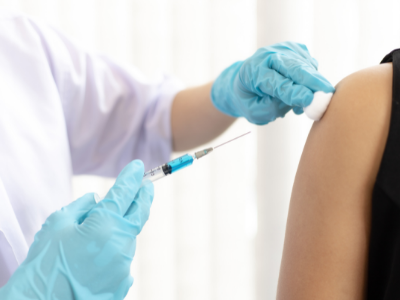Get Help Now
What is the HPV Vaccine?
The HPV Vaccine, or Gardasil, is the only vaccine that immunizes against 4 types of human papillomavirus (HPV): 2 types that cause 70% of cervical cancer cases (strains 16 & 18), and 2 more types that cause 90% of genital warts cases (strains 2 & 4). Gardasil is administered in 3 injections over a 6-month period and is recommended for girls and young women ages 9 to 26. It is not recommended for women over age 26 because it is likely most women by that age have already been exposed to HPV.
How serious is HPV?
While HPV can clear on its own, it can also cause very serious complications. Two of the types of HPV that Gardasil protects against cause 70% of cervical cancer and the other two types cause 90% of genital warts. Approximately 79 million people in the United States are infected with HPV, and approximately 14 million people in the United States will become newly infected with HPV each year. Each year, an estimated 26,000 cancers are caused by HPV; cervical cancer is the most common HPV-associated cancer among women.
Can I get the HPV vaccine if I have already been diagnosed with one type of HPV (either abnormal pap or genital warts)?
Yes, you can still get the Gardasil vaccine because it can still protect you against any of the strains of HPV that you have not yet been exposed to – it immunizes against 4 different types. It will not, however, treat or cure any existing HPV infection or complication caused by any of the strains you have already been exposed to.
Am I immune to getting Cervical Cancer if I get the vaccine?
You are not immune to getting cervical cancer, but 4 strains of the STD (HPV) that causes 70% of cervical cancer. Gardasil may not fully protect everyone, and does not prevent all types of cervical cancer, so it’s important to continue routine cervical cancer screenings. Gardasil will not protect against diseases caused by other HPV types or against diseases not caused by HPV. Gardasil also does not treat cancer or genital warts.
- Among women who have not been previously infected with the specific HPV strain, Gardasil is over 95% effective in preventing cervical precancers caused by those strains of HPV that Gardasil immunizes against.
- Gardasil has been nearly 100% effective in preventing vulvar and vaginal precancers, and genital warts in women caused by the strains of HPV that Gardasil immunizes against.
What are the side effects of getting the HPV vaccine?
The side effects include pain, swelling, itching, bruising, and redness at the injection site, headache, fever, nausea, dizziness, vomiting, and fainting. Fainting can happen after getting Gardasil. Sometimes people who faint can fall and hurt themselves. For this reason, your clinician may ask to sit or lie down for 15 minutes after they get Gardasil. Some people who faint might shake or become stiff. This may require evaluation or treatment by your clinician. Anyone who is allergic to the ingredients of Gardasil, including those severely allergic to yeast, should not receive the vaccine. Gardasil is not for women who are pregnant.
I have heard some negative stories about the HPV vaccine, should I be worried?
More than 175 million doses of HPV vaccine have been distributed worldwide and 57 million doses have been distributed in the United States, while a very low percentage of those have resulted in serious side effects. More than 7 years of post-licensure vaccine safety monitoring in the United States provides continued evidence of the safety of the HPV vaccine. Only a doctor or health care professional can decide if Gardasil is right for you, so ask your provider about it at your next appointment.

Telehealth Services Available!
Many services available from the comfort of your home. Tap/Click for more!
